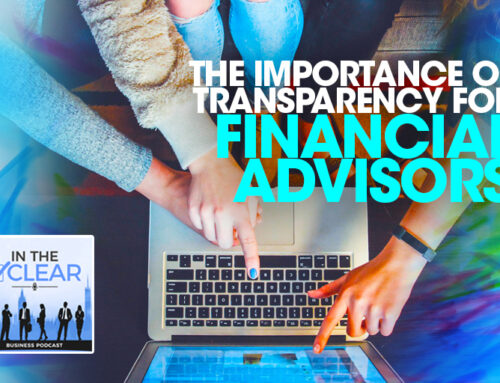 Russell Weigel is a securities attorney and a member of the Clear Business Directory. Through Investment Attorneys, he helps his clients with compliance matters, arbitration defense or investigation defense.
Russell Weigel is a securities attorney and a member of the Clear Business Directory. Through Investment Attorneys, he helps his clients with compliance matters, arbitration defense or investigation defense.Today, we’re super excited because we’re talking to one of the members of the Clear Business Directory, Russell Weigel. He is a securities attorney, his business is the Investment Attorneys. I’m super excited to have him here because he brings a plethora of information to the business world. If you’re raising capital, if you’ve ever dealt with bringing in investors, it’s so important to have somebody on your side who knows what it is that they are doing. I’ve met Russell at CEO space, Business Acceleration Network and Summit. Russell is the real deal; he isn’t only down to earth but he is extremely knowledgeable. He’s here to join us and share a little bit about what he’s doing in the world and how he can help you with your business. Russell, welcome to the show.
Thank you, Justin.
We’re so excited to have you here. Can you share with our listeners a little bit about your background and exactly what it is you do?

Most of those representations involve compliance matters that we deal with but a lot of them are arbitration defense or investigation defense.
I‘m an attorney, I’ve been practicing securities law for the last 26 years. Of that, ten and a half years I spent with the federal government as an enforcement attorney with the U.S. Securities and Exchange Commission. In that capacity I served many different roles, from investigator to litigator to management supervisor. Over the course of ten years, I became fluid with the mindset of the SEC. It’s that background that I brought into private practice. A lot of the techniques and mindsets and approach to handling security transactions and in doing defense work, protecting clients against investigations and litigations from the SEC. The primary areas of my practice are doing security transactions for both private and public companies, I represent both. I also represent people in the financial services industry. Most of those representations involve compliance matters that we deal with but a lot of them are arbitration defense or investigation defense. We handle anybody who’s in the industry or out of the industry but happens to get in the crosshairs of the SEC somehow. I am, I believe, one of the most effective defense counsels in the country for handling those matters.
We have a lot of clients that comes to us that are raising capital. They do their due diligence on the people that they’re getting involved with, but it’s so important to have somebody like yourself whose got hands on experience working directly with the Securities Exchange Commission because they can be quite the bulldogs if you’re not doing things right. Having somebody who’s got an inside view as to what to do, how to do it, and what not to do, is extremely powerful. Having somebody on your team that can assist you and guide you along the way really sets you up for success.
I know as an entrepreneur, it can be so easy to think that you know everything about raising capital and the ins and outs. But there’s so much to it and so much complexity to raising capital, what you can do, what you can’t do, what you can say and what you can’t say. It’s really easy to get yourself in trouble. We’ve seen it over and over again with clients that we work with. Knowing that they’ve got access to you in the Clear Business Directory is a huge deal. It’s just going to make their teams more powerful by having you a part of it.
Thank you. Just to clarify, in my world, all my clients are innocent. They often times get crossways with the government even when they’re innocent, when they think they’re doing things correctly, may have done things correctly and may in fact be innocent. It’s an adversarial regulatory system that we have. There’s no mediation provision in the securities laws. There’s no pass that people might get if they were arrested. Maybe on a first time basis they might get pre-trial diversion and get out of it, that never happens in the securities world.
It is adversarial; you could do right everything and still find yourself in trouble. That’s why it’s so important to have somebody who’s knowledgeable about the ins and outs of that system, to have someone like you on their team. Russell, one of things we like to ask to everybody who comes on the show is, if there was one thing that you would wish that your perspective clients could or would ask you before they engage you and bring you onto their team, what would that question be? From a due diligence perspective, that know your client due diligence. What is the one thing that you want your clients to know about you and your business?
I’m not sure if it’s something I want them to ask, but I have a threshold amount of disclosure that I require of all clients that are doing offerings or intending to do a capital raise for which they are hiring my firm to assist them. We have a very detailed questionnaire that we ask all the officers and directors to execute and return at the threshold of the engagement. If we don’t get it back we just don’t take the engagement because we expect them to be truthful to their council. If we’re going to be drafting disclosure documents that are going to be used to present to perspective investors then we want to know that we’ve got a complete disclosure because we’re going to be the ones drafting the biographical information on them.
If there are hiccups in their background, we need to know it so we can decide how to deal with it rather than having our client not tell us and then something that somebody can say later is material background information is omitted from the disclosure document because they didn’t want to let us know about it. That ends up often times being a toll hold for a fraud case. We just don’t want to go down that road and we wanted to start off the right way. We have done very complicated disclosure matters where people have had histories with the SEC before or criminal convictions, litigations in the financial area or bankruptcies and things like that. We’re able to get around these issues but we just have to be aware of them. That’s a threshold for us.
Transparency expedites trust and it makes doing business, regardless of what you’re doing, so much easier. Especially in the situation like you said, having your clients be transparent is so important. I love that fact that you model that for them because you are part of the Clear Business Directory. Everybody can go on there and take a look at your report, read you transparency report, know who you are, know what you’ve done. You model that for your clients. That’s extremely important in business where we’ve seen a huge shift in more and more businesses coming online with transparency piece because it just makes things so much easier when dealing with clients, situations and just business in general.
In the securities world in particular, it’s a requirement of the industry. Anybody who’s participating in it, who’s seeking capital and whether or not the client is a startup company and they’re not planning on doing a full blown offering document, it doesn’t matter because we still need to know who they are and what their background is. We just need to have all the cards on the table so that we can do our job the most effective way we know how.
Speaking of transparency, is there anything in your businesses that you may have experienced that you wish that you could go back and do over again or something that’s really unique that really shaped where you’re at in your business?

The court then turned around and appointed a criminal investigator to investigate me and make a report to the court.
One time in a family matter, I was trying to seek appointment as a guardian ad litem. I had other family members who weren’t too happy about it and made false and damaging reports to the court that appointed me guardian ad litem. The court then turned around and appointed a criminal investigator to investigate me and make a report to the court. I can say that I’ve been investigated. For my clients that may be facing that kind of scenario from the SEC, I’ve done this as an enforcement attorney for most of my SEC career, being on that side of the table, but having been with a gun pointed at you, that was a six month matter that ended working out just fine. It was still probably one of the most unpleasant professional things I’ve ever had to deal with. It ended up backfiring on the relatives who complained because they got in trouble with the court and so forth.
That’s so neat that you got to experience that because that really puts you in somebody else’s shoes. If you got a client that is going through that, you know exactly how they feel because you had to experience that for yourself. That’s neat in the sense that it really allows you to connect with those people, see it from their perspective and it gives you a whole other understanding. Like you said, you’ve been on the other side of it as well when you were enforcing it so you know both sides. That experience in itself is invaluable when it comes to hiring a securities attorney such as yourself. You can bring a lot of unique experiences that you bring to the table that other securities attorneys don’t necessarily have.
That experience was humbling, if nothing else. It’s true, I can easily hold the hand of my client and walk through the valley of death with them because that’s often times, in those situations, what it feels like. You’re whole world is at issue and you don’t know where to turn. You need somebody you can trust implicitly whose going to be there for you. Frankly when I litigate, I bring all that to the table. I fight like hell for my clients because I know what they’re going through. That’s how we play the game.
I know you’re a mentor to so many and an educator as well. I know you love sharing your knowledge of the securities industry. Is there one piece of advice that you would like to share with our listeners and your perspective clients about what and how they should be doing when it comes to raising capital?

Capital For Keeps is designed to assist entrepreneurs and executives in planning through a potential capital raise.
I wrote an entire book on this subject and it’s called Capital For Keeps. The book is designed to assist entrepreneurs and executives in planning through a potential capital raise. It doesn’t tell them how to do a capital raise because there’s plenty of people out there that’ll tell you how to do it. From a legal perspective, it gives them the full gamut of what their looking at in terms of risks and gives them the descriptions of the exemptions from registration that they’re going to have to work through. Their attorneys may or may not explain it to them. This gives them all a background and arms them for conversations with their attorneys to help them think about the process and give them options that they might not have even be aware of. The book takes you through what I would take a client through in terms of initial education about the process, what the lawyer has to do and what they should expect in the legal side of things that they’re getting into.
The reason that I wrote the book in the first place is I did it as more of a warning, because in my defense practice I run across people all the time who made simple mistakes. If they knew in advance what they were getting into and the potential consequences are, did they really want to do this, were there are alternatives to them that they could’ve considered and why did it have to be this way. If they could’ve avoided walking into the so-called shark infested waters unknowingly, some of them would’ve avoided it. I’m not saying you shouldn’t raise capital; I’m probably as much of capitalist as anybody. But there are folks who might not approach things the same way if they were more educated about the process.
I certainly want to minimize the number of people that show up at my door needing defense assistance. That was really the goal. It seems to me that some of these things could be preventable by folks who were better educated. That’s the point of that. Get some understanding and make sure this is what you want to do. Get counseled throughout the whole process of doing the capital raise, from planning to execution, to make sure you stay well within the guidelines. We don’t want any of our clients deviating. That’s the safest thing they can do. We want them to be successful and we want them to raise the capital and we want their business to flourish. We want to be their clients for the entire duration of their corporate lives. That’s our goal, we prefer to be their transactional attorneys rather that their defense counsel.
It’s a completely different ball game when you’re coming in to do transactions versus having to defend somebody. The education piece, especially when raising capital, is so important just because it’s got so many moving parts. You have to ask yourself, “Is this what you want to do?” The complexities that are involved in it are important to understand and what it really takes to raise capital, to raise that kind of money. Is there a place where people can go, take a look at you website and learn about your book Capital For Keeps?
The website for the law firm is www.InvestmentAttorneys.com. The book has its own website which is www.CapitalForKeeps.com.
Thank you so much for being on the show today. You can also check out his profile at ClearBusinessDirectory.com
This was awesome. I appreciate it.
Before you get involved with anybody, make sure that their business is in the clear.
Learn more about Russel Weigel.
Podcast: Play in new window | Download




